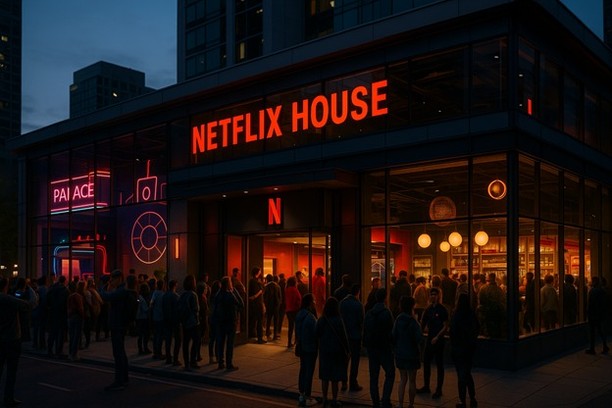Netflix House Opens: Inside Netflix’s $100 Million Leap into Immersive Entertainment
Netflix has officially opened its first full-scale “Netflix House,” a 100,000-square-foot venue in Pennsylvania that brings its hit shows to life through interactive sets, themed dining and retail. The move marks the streaming giant’s bold entry into the physical entertainment economy, blending digital IP with high-margin experiences and setting the stage for a new revenue era.
Netflix Takes Its Stories Offline
Netflix has built an empire on the screen—but now, it’s going offline. The company’s debut “Netflix House,” which opened this month inside the King of Prussia Mall in Pennsylvania, offers fans an immersive 360-degree world inspired by its biggest shows like Squid Game, Wednesday and Bridgerton.
Visitors can explore meticulously recreated sets, dine in show-themed restaurants, and shop for exclusive merchandise—all under one roof. The venue includes a 200-seat theater and a retail wing packed with limited-edition collectibles. A second Netflix House is set to open in Dallas next month, with plans for further sites in major global cities.
Netflix CMO Marian Lee said, “We’re not doing this for the revenue piece—it’s about giving fans something they can touch, share and remember.” But analysts suggest this is far more than fan service—it’s a bold business experiment.
The Financial Strategy: Diversifying Beyond Streaming
Behind the spectacle lies a clear financial play. After years of subscription saturation, Netflix is expanding into physical commerce. Each Netflix House represents a potential multimillion-dollar annual revenue stream from ticket sales, dining, merchandise and corporate events.
According to early industry projections, the King of Prussia site alone could generate upwards of $25 million annually through admissions priced between $15 and $39, exclusive branded products and themed experiences.
Brandon Katz, director of insights at Greenlight Analytics, noted, “They’re turning content into culture—and culture into cash. This is how a streaming company becomes a lifestyle brand.”
Netflix’s stock has already seen investor optimism following the announcement, as experiential retail emerges as a new profit frontier for major entertainment brands.
Legal and Operational Challenges in the Real-World Shift
Transforming from a streaming platform to a physical operator also introduces a wave of legal, logistical and governance complexities.
-
Licensing and IP Management: Netflix must secure long-term licensing for its shows, ensuring every set, soundtrack and character used in Netflix House complies with global IP law.
-
Venue Regulations: Operating in malls across the U.S. means adhering to zoning, fire safety, ADA accessibility and food-service standards.
-
Revenue and Accounting Models: Income from tickets, merchandise and food sales requires a shift from subscription-based accounting to multi-channel financial management.
According to analysis reviewed by CEO Today, the streaming giant’s legal teams are working closely with entertainment lawyers and local regulators to develop a compliance framework that could serve as a model for future experiential ventures.
Inside the Business of Experience: The Rise of “Phygital” Commerce
The concept behind Netflix House is known as “phygital”—a blend of physical and digital engagement designed to extend brand loyalty. Netflix’s move positions it alongside companies like Disney, Warner Bros. and Universal, who have long monetized their IP through theme parks and live events.
For Netflix, this expansion could unlock a secondary growth engine at a time when competition in streaming remains fierce. The global market for experiential retail is forecast to exceed $57 billion by 2027, with media-driven experiences leading the way.
Mall owners and developers, too, are benefiting from Netflix’s arrival. The King of Prussia Mall has already reported increased foot traffic, validating the model’s economic potential for struggling retail spaces.
The CEO Playbook: Lessons from Netflix’s Move
-
Diversify early: Expanding beyond your core product can protect against market saturation.
-
Own your IP: Controlling intellectual property enables new revenue channels, from merchandise to live experiences.
-
Build governance frameworks: Physical expansions bring regulatory and operational risks that demand robust oversight.
-
Create emotion, not transactions: Netflix’s success lies in turning fan emotion into sustained engagement.
The Future: A Global Network of Streaming-Powered Worlds
With two venues already confirmed and others in planning, Netflix’s long-term goal is clear—transform its storytelling power into physical ecosystems that drive profit, loyalty and cultural dominance.
If successful, the strategy could redefine how entertainment brands operate—bridging the gap between screen time and real-world experience. As one retail strategist told Variety, “This isn’t the future of Netflix. This is the future of entertainment itself.”
Conclusion
Netflix’s venture into real-world entertainment marks a historic moment for the company and the industry. From streaming queues to physical lines outside Netflix House, it’s proof that even in a digital age, people still crave connection—and companies willing to deliver it could own the next decade of growth.














